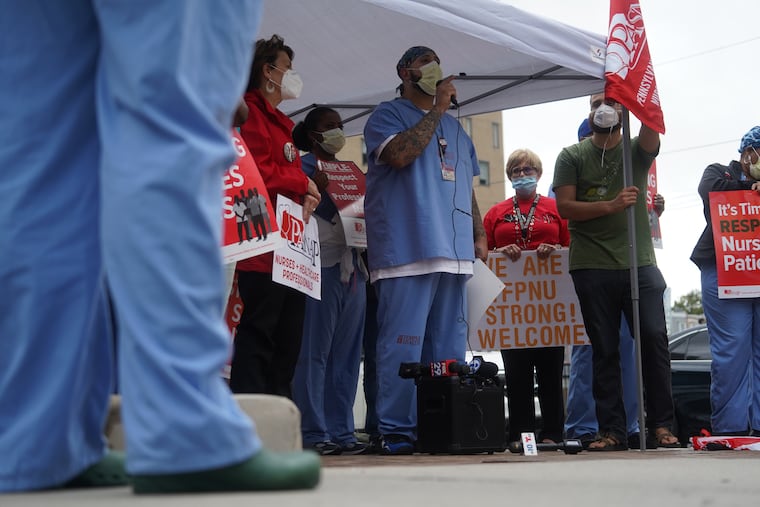Temple nurses say staffing issues could mean dangerous conditions
Hospital union officials say they’re calling attention to a problem that’s not confined to Temple.

Nurses and technicians at Temple University Hospital say they’re experiencing staffing shortages that are putting patients and staff at risk, and are calling on hospital administration to hire more nurses and do more to retain staff.
Hospital staffers held a news conference outside Temple’s main hospital campus in North Philadelphia on Thursday afternoon, and spoke of working long hours with few breaks, trying to care for too many patients, and worrying that they’re missing important signs of illness along the way. And, staffers said, Temple is still dealing with more COVID patients than other hospitals in the city, at a time when hospitals are nervously monitoring case counts.
“We need time,” said Mary Adamson, a Temple registered nurse and the president of the Temple University Hospital Nurses Association, a division of the Pennsylvania Association of Staff Nurses and Allied Professionals (PASNAP). The union represents 1,500 nurses and 800 other staffers at the hospital’s main campus. “When a patient crashes, it happens really fast. But there are many signs patients exhibit before that crisis -- and when you have too many patients, you’re running from room to room, you miss those signs.”
Temple Hospital representatives did not reply to an email requesting comment.
Philadelphia has reported 1,580 new COVID-19 cases in the last week, an increase of 48% compared with the previous week. COVID-19 hospitalizations also rose slightly over the last week but remain far below the levels experienced by the city in December. The city does not release those data for individual hospitals.
PASNAP had organized similar news conferences outside hospitals around the state Thursday, and union officials say they’re calling attention to a problem that’s not confined to Temple. At Temple, they said in a news release, the hospital’s emergency department, cardiac catheterization lab, and medical-surgical units are “critically understaffed.”
Adamson said that staffing shortages can also put nurses and techs at physical risk. “When I’m alone, and my patient is falling, it’s my back,” she said. “When I’m rushing and trying to draw blood and someone else is going through a crisis, I stick myself. It’s not only that our patients don’t do better, but health care givers and professionals are getting hurt.”
Colleen Rabbit, a clinic nurse at Temple, said nurses treating less acute conditions also need help. Treating people with chronic conditions like addiction or kidney disease requires more staff and more services, she said. “These people need extra nurses on the front line,” she said.
The nurses and technicians are also calling on the hospital to offer better incentives for working overtime; currently, nurses are offered an extra $4 an hour on top of time-and-a-half pay for overtime shifts, and technicians are offered no extra incentives, said Carlos Aviles, a pharmacy technician and president of Temple Allied Professionals, another PASNAP-affiliated union. That’s not enough, he said, when long hours and short staffing are already taking a toll.
“The sign outside the hospital said, ‘Temple heroes work here,’” he said. “My people don’t really feel like heroes. Other hospitals have resources, but they don’t have the patient population needs. And our nurses are run so thin.”
They also want hospital administration to work to retain staff that are resigning even as new hires come in. PASNAP officials noted that Temple hired 39 new nurses in August, but in the same month, 28 nurses either resigned or went on leave.
Aviles said that the last 18 months of the pandemic have felt like winning one fight and then immediately turning to another. “At the beginning, our biggest crisis was PPE,” he said. “Now, we don’t have staff.”
Staff writer Rob Tornoe contributed to this article.